TEASER - 18
LOOSER CAN BE WINNER
The scoring system in Lawn Tennis goes through a tortuous four course steps. A player has to win first points, then games, then set and only then he wins a match.
The winner always wins more games than the looser,
(a) True
(b) Fall
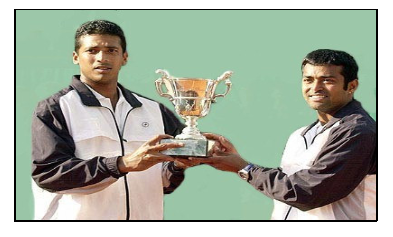
THE EXPLANATION:
Lawn Tennis is played with four tiers / steps of scoring system.

A player has to win five (5) points first with a gap of two to win one game, then he has to win six (6) games first with a gap of two to win one set and win maximum set out of five or three to win a match.
In this system each set is like an independent match and have to be won separately. No weightage is given to the games won in previous set and it does not matter whether previous set is won by 6 - 0 or 7– 6, both have same value.
In case of a score line of 0-6, 7-6, 7-6, 0-6, 7-6, the winner gets away with 9 fewer games than the looser. Out of a total possible 51 games in the match, the looser have won 30 (58%) and winner only 21 (42%) thanks to rules framed to favor one with no breaks, barring tie breakers.
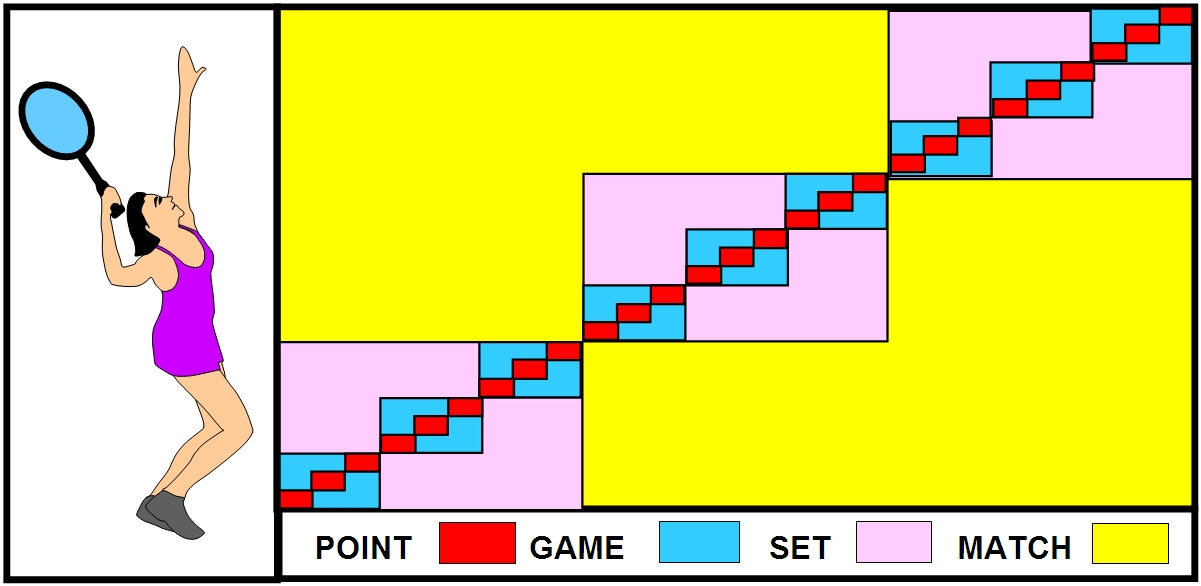
TENNIS MATCH: MOST TORTUOUS SCORING SYSTEM
Badminton is also played on same scoring system but with one tier fewer than Tennis;

Here, a player has to win points first, then sets and only then a match is won. Each set is like an independent match and have to be won separately and no weightage is given to points won in previous set whatever may be the margin.
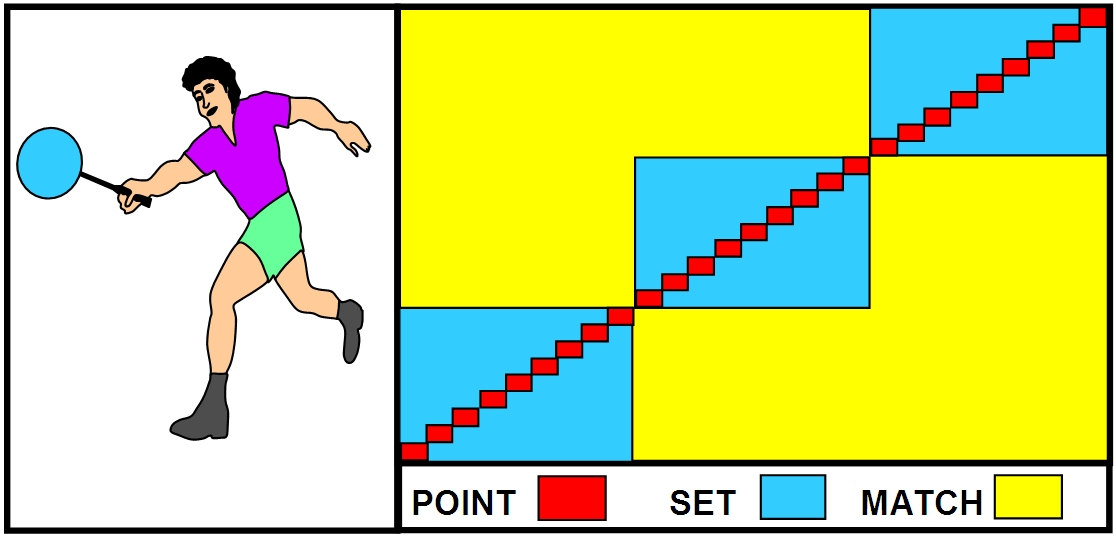
BADMINTON: LITTLE LESS TORTUOUS SCORING THAN TENNIS
The scoring system in basket ball, on the other hand is the most simplest one. No segments, no layering, no tier, you win more points you win match. Entire match is one entity. First part is not forgotten and points won from the start get full weight age and is carried forward till the end of the match.
A great tempo and excitement is generated from the word go and never a dull moment creeps throughout the match.

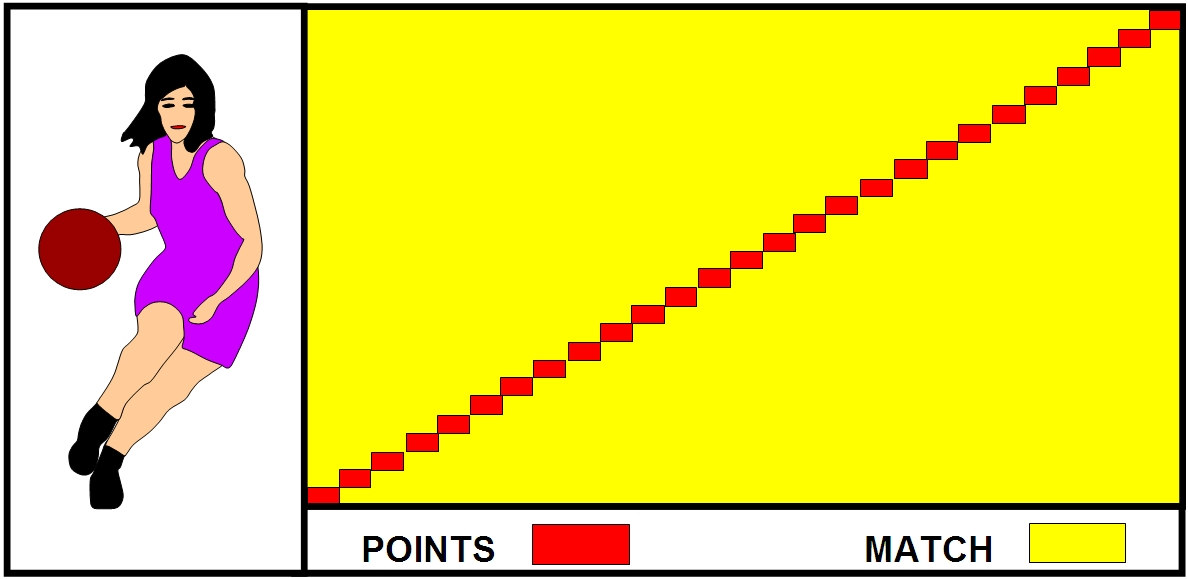
BASKET BALL: SIMPLE SCORING SYSTEM
Some Examples of Close Tennis Matches:
Women’s Events:
1. US Open Women’s Final 1985
Hana Mandlikova def. M. Navratilova: 7- 6, 1- 6, 7- 6.
Or
Martina Navratilova def. Hana Mandlikova : 18 - 15
Two-time US Open champion Martina Navratilova won a total of 18 games (6+6+6), where as Hana Mandlikova won 15 games (7+1+7), 3 games less than the Martina, in the US Open final of 1985 but still Martina lost the match.
The result would have been just opposite, had basket ball type scoring system was followed. Hana took her chance more carefully and reserved energy for the crucial set where it mattered most. Had it been 5 setter Martina would have definitely won the match as she showed consistency.
2. US Open Women’s Final 1994
Arantxa Sanchez def. Steffi Graf: 1- 6, 7- 6, 6 - 4.
Or
Steffi Graf def Arantxa Sanchez : 16 - 14
Steffi Graf won a total of 16 games (6+6+4), 2 games more than the total of 14 games (1+7+6) won by Arantxa Sanchez Vicario in US Open 1994 but still she lost the match. Had the points / games scored in previous set been carried forward till the end of the match Steffi would have been a clear winner (16 - 14).
3. Wimbledon Women’s Final, 1993:
Steffi Graf def. Jana Novotna: 7- 6, 1- 6, 6 - 4.
Or
Jana Novotna def Steffi Graf: 16 - 14
Steffi Graf won a total of 14 ( 7+1+6) games, 2 games less than Jana Novotna, who won a total of 16 (6+6+4) games in the entire match but still she lost match? The cumulative system would have produced just opposite result.
Men’s Events:
1. Wimbledon Men’s Final, 2009:
Roger Federer def. Andy Roddick: 5-7, 7-6, 7-6, 3-6, 16-14
Or
Andy Roddick def. Roger Federer : 39 - 38
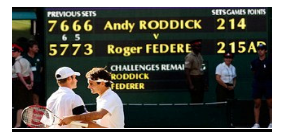
One of the longest and keenly contested match ever played at the Wimbledon. Inspite of winning more games (39) than Roger (38), Andy lost the match, why? At least I am hugely disappointed. I thought Andy had upper hand and looked more sharp than the aging war horse Roger throughout the game.
2. Montreal Masters Men’s Final, August 2007
Novak Djokovic def. Roger Federer: 7- 6, 2- 6, 7- 6
Or
Roger Federer def. Novak Djokovic 18 - 16
The serb, Djokovic beat Roddick, Nadal and Federer, the top 3, 2 & 1 of tennis at that time in a row, a big feat indeed. However he was very lucky in the final as he won title with a deficit of two games. The king Federer could have easily won had it been five setter, I am sure, as he had already collected more breaks and more games than Novak. Tennis, curiously does not recognise previous set. New set starts as a new match. Federer could not do any thing but look to next event.
3. ATP/WTA Miami Masters Event, 4th Round, April 2007
Guillermo Canas def. Roger Federer: 7- 6, 2- 6, 7- 6.
Or
Roger Federer def. Guillermo Canas: 18 - 16
Roger Federer faced same situation here too. Guillermo Canas of Argentina, had stunned him, 7-6, 6-2, 7-6 in the forth round of ATP/WTA Miami Masters Series event in April 2007. Federer had said then that it was one of those matches where he should have never lost. But did he loose? In fact he won more games, but thanks to weird rules that did him in.
4. US Open Men's Singles Fourth Round, 1987
J. Connors def. M. Pernfors: 1- 6, 1- 6, 7- 5, 6 - 4, 6 - 2
Or
M. Pernfors def. J. Connors: 23 - 21
This is considered to be one of the greatest come back match of the US Open tennis where Connors made it to quarterfinals in spite of 2 set down. On a cumulative basis Pernfors won a total of 23 games (6+6+5+4+2), 2 games more than Connors who won a total of 21 games (1+1+7+6+6). Continuous scoring system, without any break between sets would have made Pernfor winner.
5. Wimbledon Men’s Final, 2007:
Roger Federer def. Rafael Nadal: 7-6, 4-6, 7-6, 2-6, 6 -2
Or
Rafael Nadal drew. Roger Federer: 26 – 26.
Locked in the toughest test, Roger Federer finally overcame Rafael Nadal in a five-set epic final to win his fifth consecutive championship at the All England Club. However, the match could have gone either way. Both won equal number of games (26 each) but still Nadal was denied further chance.
At this stage the match was equally balanced and should have ended in a draw. Nadal had more breaks and showed more consistency and should have been given more chances to prove his prowess, however, laws of the game, made by wise men had other things up the sleeves.
6. Wimbledon Men’s Final 1992
A. Agassi def. G. Ivanisevic: 6 - 7, 6 - 4, 6 - 4, 1- 6, 6- 4.
Or
G. Ivanisevic drew. A. Agassi: 25 - 25.
Goran blasted 37 aces and won a total of 25 games (7+4+4+6+4) equal to that won by Agassi (25 games) and still lost. The dual was a photo finish and needed an extraneous and crooked process of scoring system to decide the winner.
Why this discrepancy?
In all above matches the looser has won more or equal number of games and showed better consistency but they still lost the match. The rules seem to favor the opportunistic, cunning and to those who are conserving energy deliberately and ruthlessly pouncing on few chances coming their way. Unlike basket ball match, where tempo is maintained throughout the match, tennis is played in hiccups. Each set is like a separate match and at times players deliberately slowdown to come back in next set and dullness creeps in. Had points been carried forward in a seam less manner the boring moments would have been minimized and consistency would have been rewarded. So it is not necessary that winner always wins more games, it is the looser, may win more games but still shown the door. It is a shame !
We see a great ambiguity here. On one hand a lot of weightage and importance is attached to the distant past performance of a player while seeding them (so to give them unfair advantage), but the performance in the immediate past (previous set) is totally ignored and a new set begins afresh from scratch.
********









